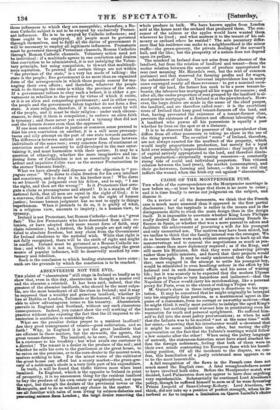ABSENTEEISM NOT THE EVIL.
Tim plaint of "absenteeism" still rings in Ireland so loudly as to show that, even in this day, absenteeism is thought a master evil and the absentee a criminal. It has been said, indeed, that the greatest of the absentee landlords, who should be the most culpa- ble, are the most beneficent of all the class in Ireland; and it may be suppesed that a wealthy and generous landlord, whether he live at Dublin or London, Tullamore or Richmond, will be equally able to allow advantageous terms to his tenantry. Absenteeism prevails in England and Scotland, without any such clamorous consequences. Indeed, you cannot show the evil working of the practice without also exposing the fact that the ill imputed to ab- senteeism is ascribable to something else.
What are the peculiar duties proper to a resident landlord? Are they good management of estates—good cultivation, and so forth ? Why, in England it is not the great landlords that are efficient in those matters, but the stewards, the agents, the great tenant-farmers. The landlord, to be sure, if resident, may be a. customer to his tenahtry : but what avails one customer in a.district ? The tenant is a dealer in the produce of the soil ; and whether be sells his corn to the gentleman at the great house, to be eaten on the premises, or to the corn-dealer in the nearest town, matters nothing to him. For the minor wares of the cultivator the great house can afford but a scanty market—the green-gro- cery of a nobleman's abode is every little part of his expenditure. In truth, it will be found that traffic thrives most when least localized. In England, which is the opposite to Ireland in point of prosperity, it is no uncommon thing for the resident landlord to buy the produce of his own estate or neighbourhood, not upon the spot, but through the dealers of the provincial towns or the Metropolis, and to do so without any choice in the matter. We ass all familiar with tales of men living by salmon-fisheries and mooring salmon from London the large dealer removing the
whole produce in bulk. We have known apples from London sold at the house next the orchard that produced. them. The con- sumer of the salmon or the apples would have wanted them wherever he lived; and what matters it to the tenant of his salt monry or orchard where he resided ? The sole pecuniary differ- ence that his residence can make to a neighbourhood is the minor traffic—the green-grocery, the private dealings of the servant's hall, and the like; but the prosperity of a nation does not depend' upon its pedlars.
The mischief in Ireland does not arise from the absence of the landlord, but from the relation of landlord and tenant—from the undue relation between the amount of produce appropriated to rent (not meaning Mr. Ricardo's rent, but the rent of common parlance) and that reserved for farming profits and for wages, the subsistence of labour. Universal improvidence has in many cases expunged nearly all those revenues : to get a nominal occu- pancy of the land, the farmer has sunk to be a mere tenant-la- bourer, the labourer has mortgaged all his wages for conacre ; anct after all, the undue proportion of rent grasped by the landlord is al- . most gone in mortgages. All Ireland is at the pawnbroker's. How- ever, the large drains are made in the name of the chief pauper, the landlord, and are therefore called rent : it is the exorbitant rents of Ireland that keep good tenant-farmers off the land, and that, having prevented the existence of a tenant-farmer class,. prevents the existence of a distinct and efficient labouring class. A landlord who pawns all his possessions is equally a pest whether he lives on the spot or at a distance.
It is to be observed that the possessor of the pawnbroker class differs from all other possessors in taking no share in the use of the thing pawned. The so-called " rents " of Ireland, therefore, are not always exacted for the usufruct of the property, which would imply proportionate production, but merely for a legal hold over somebody's improvident necessities : they imply a lack of capital actively appropriated to the land, and therefore dimin- ished production—perpetually waning resources—a constantly rising tide of social and individual pauperism. This vitiated relation between the land (rent), the market (consumption), and their go-betweens, farming and labour,— this is the evil that inflicts the wound when the Irish cry out against "absenteeism."


























 Previous page
Previous page